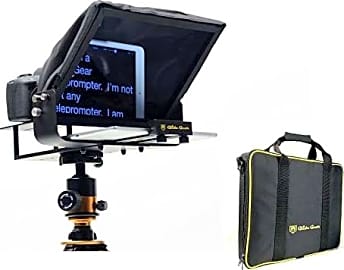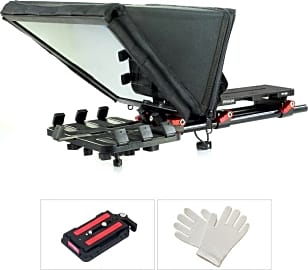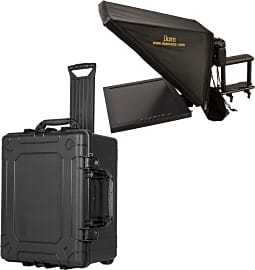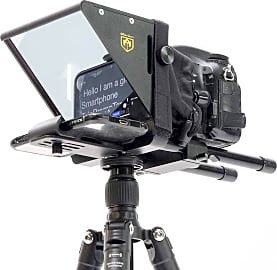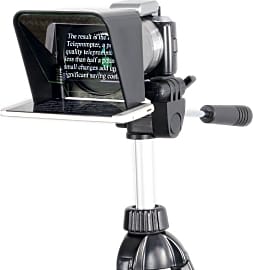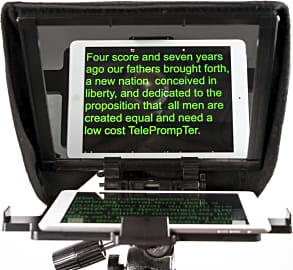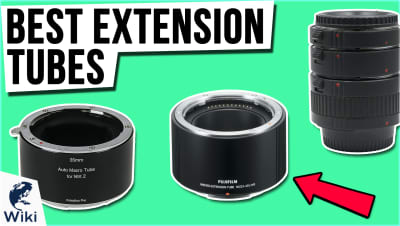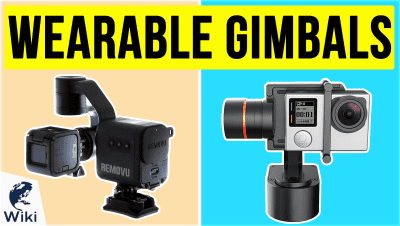The 7 Best Teleprompters

This wiki has been updated 41 times since it was first published in March of 2015. There is no need to memorize the scripts for presentations, lectures, news summaries, or infomercials, if you have one of these handy teleprompters. We’ve included models that attach to tablets, tripods, and a wide variety of cameras, and that offer a range of features, including clear screens and adjustable font sizes and scrolling speeds, and some of them aren't even all that expensive. When users buy our independently chosen editorial choices, we may earn commissions to help fund the Wiki.
Editor's Notes
June 11, 2021:
An older model from OneTakeOnly has fallen out of stock and been surpassed in performance by some of the less expensive models on our list, so it's been removed. Instead, we've added the Glide Gear TMP 75 partly because it's designed for use on laptops. Granted, it doesn't work perfectly on most laptops out of the box, but it's one of the rare options that should do so with just minor modification. Otherwise, the Ikan PT3700 TK remains the best professional option and the Glide Gear TMP100 provides plenty of bang for the buck.
January 08, 2020:
Since so many of these models have come to rely on their owner's smartphones and tablets for use as monitors, we wanted to make sure that the platforms on which you're meant to place your device were as sturdy as possible. That's what led us to remove both the Prompt-it Maxi Beamsplitter and the InteractMedia Mini R810-10 from our ranking, as neither had a particularly reliable system for holding your device in place. The tripod could then be bumped hard enough, or a vertical adjustment on a video head be left too loose, and one of the most expensive components in your entire setup could come tumbling to the ground.
By comparison, a model like the Proaim Universal Professional P-TP300 has an eight-point security system that borders on difficult to use because it grips your tablet so securely. Then, there are models that come with their own screens and circumvent this issue altogether. These include both the Ikan PT3700 Kit and the pair of models in our special honors section. These are among the best options on the market with some specialty applications, but one thing tying all these offerings together might just be their pricing, as the all range into the four-figures territory.
Special Honors
Stafford's Stageprompter Wedge 03 This an ideal choice for singers and musicians, especially bands with large catalogues of originals or a tendency to play a lot of covers. It can display both the lyrics and chord changes to any song you program into it, and it's controlled by a convenient footswitch. Best of all, it looks like an innocent stage monitor, so no one will accuse you of cheating. stageprompter.com
Prompter People Stage Pro Presidential If this pair or prompters looks familiar, that's because it's the same type employed by presidents and world leaders to deliver speeches at major venues. They're relatively unobtrusive, even in a shot, and they work with large, easily managed monitors that come in sizes ranging from 15 to 24 inches and are available in two brightness settings. It's a comprehensive kit, but it's not cheap. prompterpeople.com
A Trick Of Mirrors
What's more, in today's context, public speaking rarely exists without the presence of a camera.
In the hierarchy of nightmares, a great many people rank public speaking toward the very top. In the context of evolution, this actually makes quite a lot of sense. Human beings are, after all, pack animals. Before establishing an agrarian society, we were nomadic hunters and gatherers surrounded by all sorts of predators; our association with a group was our primary source of protection against certain death.
When you get up in front of an audience to speak, you find yourself separated from the pack in a way that, only a few dozen millennia ago, would have seen you eaten by wolves or starving to death. It makes sense then that our bodies would guard against this kind of willful ostracization.
It behooves you to employ every trick in the book to maintain the most professional, confident exterior when speaking, and nothing looks so pathetic and unprofessional as forgetting your speech. What's more, in today's context, public speaking rarely exists without the presence of a camera. I don't want to delve too deeply into what the presence of that camera can do you your nerves, but not only will these teleprompters feed you the precious lines you need so desperately to remember, they'll also conceal the eye of the camera lens from your view, which could make speaking into it much easier.
Teleprompters work by situating themselves between you and the camera, just in front of the lens. A timed, computerized feed of your speech's text flows along a screen that faces the ceiling. From there, it's all in a reflection.
The text coming out of your teleprompter screen is upside down and reversed, but when it hits a piece of beam splitting glass held at roughly a 45-degree angle off of the screen, the text appears as normal to whomever stands in front of the lens. The angle of the glass prevents the light of the screen from entering the camera, while also allowing the light you're reflecting to make its way to the camera's sensors, where it belongs.
Splitting Hairs Or Splitting Beams?
I'm extremely grateful for the fact that, just as I found out I needed them, glasses became cool again. As all things go in fashion, trends tend to ebb and flow, and glasses had ridden a long uncool streak before I hit my teenaged years. It's entirely possible, though, that they'll slip back out of style sooner than later.
You'll see the value of teleprompter glass expressed as a ratio, most commonly 70/30, 60/40, or some such iteration.
Teleprompter glass has beam splitting capabilities, which do a great amount of the work keeping the light from your screen from ever reaching your camera lens, but that may render your text display too dim. However brightly you can display the text on your teleprompter could mean the difference between you and your hosts straining your eyes to the point of damage and you all appearing relaxed and confident on screen.
You'll see the value of teleprompter glass expressed as a ratio, most commonly 70/30, 60/40, or some such iteration. The first number represents the reflective value of the glass, while the second conveys its transmission value. Glass rated at 70/30 will reflect 70 percent of the light from the upside-down text coming off the teleprompter screen, while letting 30 percent of the light from the scene through to the camera.
That means that the more brightly you can get your teleprompter text to reflect, the less your camera can capture the image of you speaking. The light loss here is great. There is, of course, 60/40 and 50/50 glass, which will let more of your light through, but you have to turn down the brightness on your screen lest you also convey its light into your lens.
This comes down to a question of the camera and your lighting. If your camera and its lenses are capable of capturing the scene with only 30 percent of its light getting through, then you can get away with a more intensely reflective beam splitter. If you have weak lights and a lesser camera, you'd do better to look for a more balanced beam split, even if it dooms you to a life lived in spectacles.
Promptly Historical
Until this recent golden age in television, most people dismissed television actors as second rate, if that. The real actors worked on the big screen. Well, television has always been a faster-moving medium. Film actors often relish in weeks or months spent working on a script and a character, where TV stars would usually have a very short amount of time with recently written pages. They'd be lucky to memorize them, let alone make something spectacular out of them.
These early prompters were mechanical, operated by a technician who stood below or beside the camera.
Which is why Fred Barton Jr. and a few of his pals invented the teleprompter in 1950 with the specific intent to help TV actors with their lines. Up until this point, TV producers relied on cue cards to perform a similar service, and if you've watched any SNL in the past 15 years, you've seen how awkward heavily relying on cue cards can make a performance.
These early prompters were mechanical, operated by a technician who stood below or beside the camera. Herbert Hoover used one in 1952 at the Republican National Convention, and Dwight Eisenhower broke new ground in the Chambers of Congress by being the first president to use one during the State Of The Union Address. Now that they've become computerized, you'd be hard-pressed to find a politician, news anchor, or host of any kind speaking without one.


